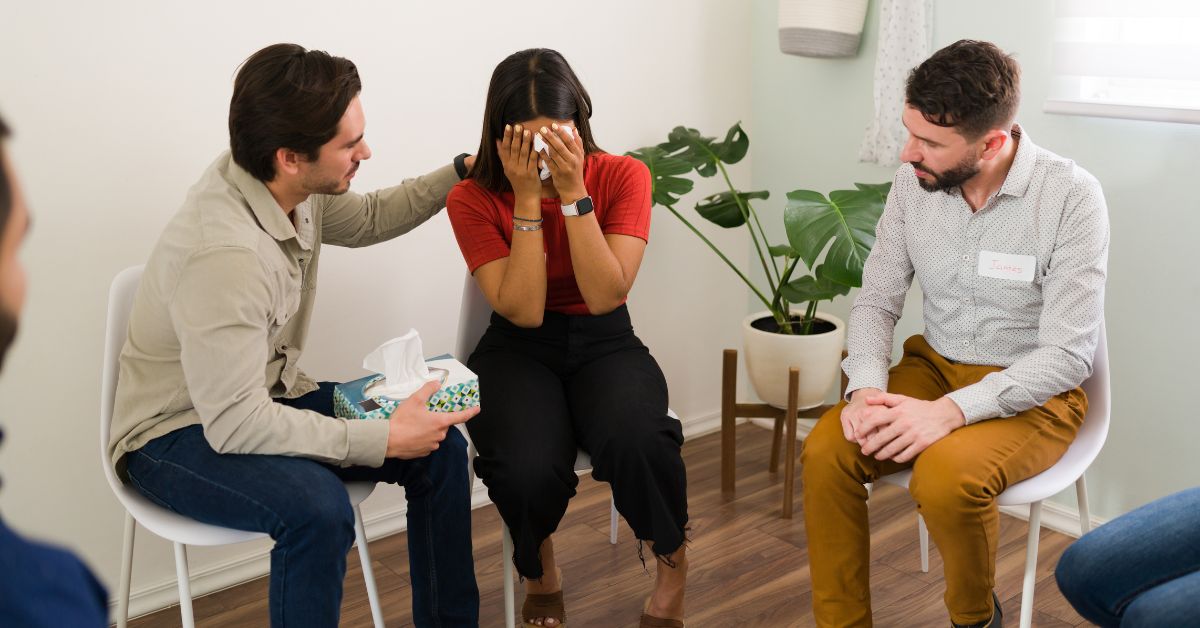Watching the people you care about suffer from addiction can leave you feeling lost and hopeless, but rest assured that hope exists and recovery is possible. As an addiction expert dedicated to helping families and individuals overcome the burdens of the disease, I can attest to the challenges of recovery but also its immense value.
Drug addiction is a complex and daunting issue that impacts not only the person with the substance use but the rest of the family as well. In this article, the aim is to provide a clearer understanding of the substance abuse problem, its signs and symptoms, and its consequences on the affected person.
Ready? Let’s dive in.
Understanding Drug Addiction and How It Affects the Addict

Addiction is a chronic disease that affects the brain and behavior of the addict. It is characterized by compulsive drug or alcohol seeking and use, despite the harmful consequences that may result. The addictive substances can be both legal, such as prescription drugs, or illegal, such as cocaine or heroin.
The abuse of substances involves both psychological and biological factors. Repeated alcohol and drug use changes the brain’s chemistry, making it difficult for the addict to control their drug use. The addict may experience intense cravings for using drugs and may go to great lengths to obtain them.
Again, it’s not impossible for anyone to overcome drug and alcohol abuse. With the right understanding, you can begin by talking to the people you care about out of their addiction.
FREE: Get the 3 pieces of advice that helped me understand this disease of addiction
Signs and Symptoms
As part of helping those you care for with their abuse and addiction, It is important to be able to recognize the symptoms and signs of substance abuse. Some physical signs may include bloodshot eyes, dilated pupils, and changes in appetite or sleep patterns. Behavioral signs may include neglecting responsibilities, withdrawal from family and friends, and engaging in risky behaviors.
| Physical Signs | Behavioral Signs |
|---|---|
| Weight loss | Mood swings |
| Insomnia | Withdrawal from family and friends |
| Bloodshot eyes | Neglecting responsibilities |
| Unexplained injuries | Engaging in risky behaviors |
| Poor hygiene | Financial issues |
How Drug Addiction Affects the Addict
There are many ways addiction affects the person. It can have severe health, social, and psychological implications. The individual may experience physical health problems such as heart disease, liver damage, and respiratory problems. They may also experience social isolation, job loss, and financial difficulties. The psychological implications may include depression, anxiety, and other mental health disorders.
How Drug Addiction Affects the Family

Dealing with an addicted family member can be one of the most challenging experiences a family can go through. Particularly because it is a situation that also affects the family in many ways. Here are some of the consequences of addiction on the family and how to cope with it.
- Emotional Toll on Family Members. It’s emotionally taxing to watch someone you care about struggle with drug and alcohol addiction. Family members of addicts may feel a range of emotions, including guilt, anger, and sadness. It’s common to feel like you’ve failed them or that you’re not doing enough to help them. These negative emotions can take a toll on mental health and well-being.
- Impact on Family Relationships. Drug addiction can cause strain on family relationships; it can lead to a disconnected relationship with the ones struggling with it. Communication may break down, and trust may be lost. Family members also experience conflict and tension. It’s important to address these issues and work on rebuilding relationships to support the recovery process.
- Financial Implications for the Family. There are also financial implications for the family. Treating a substance use disorder isn’t cheap, and families may struggle to pay for it. It can lead to job loss and legal issues, which further escalates the financial burden on the entire family. If your loved one abuses drugs, here are a few places to get help without straining your finances.
- Family Roles in an Individual’s Addiction. Family members and dynamics can contribute to the development of addiction. Trauma, stress, and other environmental factors can increase the risk. In dealing with alcohol abuse and drug addiction, it’s important for families to examine their roles and work toward healing and recovery together.
WATCH: Free, confidential workshop that explains how to "Love Another Way"
Steps to Dealing with a Loved One’s Drug Addiction

How do you deal with anyone who abuses drugs or alcohol, particularly when they are family or people you care about? Let’s learn:
- Initial Reactions and Emotions. When dealing with someone’s substance abuse, it’s common to experience a range of emotions. You may feel shocked, denial, guilt, or anger. It’s important to acknowledge and process these emotions to move forward. Seek support from friends, family, counselors, or treatment professionals to manage these emotions.
- Importance of Open Communication. Open communication is important to approach the addicted one with empathy and a willingness to listen. Avoid placing blame or making accusations, as this can lead to defensiveness and resistance. Be honest, direct, and respectful in your communication.
- Establishing Boundaries and Consequences. Setting boundaries and consequences is an important part of establishing clear boundaries and communicating them effectively. Consequences should be meaningful and enforceable. Remember that boundaries and consequences are not punishments but rather a way to protect yourself and encourage addicts to seek help.
- Prioritizing Self-Care for Family Members. It’s important to prioritize self-care for family members. This can include seeking support from friends or a professional, engaging in healthy activities, and taking time for yourself. Remember that self-care is not selfish but rather a necessary part of supporting your dear one’s recovery.
- Seeking Professional Help and Support Groups. Seeking professional help and support groups is an important part of dealing with a loved one’s addiction. Support groups can also be a valuable resource for families. There are groups dedicated to specific drug use, such as Marijuana Anonymous, that teach addicts how to deal with weed addiction. Connecting with others who have gone through similar experiences can provide comfort and validation.
Addiction Treatment Options

You understand the consequences of addiction to the family and have learned how to deal with addicts. Now, let’s talk about some of the treatment options and how you can support your loved one on their journey to recovery.
GET: The 3 things that actually "allowed" me to help my son (and regain control again)
What is the Role of Intervention?
Intervention is a necessary first step in helping an addict. It is a carefully planned process where family and friends come together to confront their loved ones about their substance use and encourage them to seek treatment. While it can be a difficult conversation, it is often necessary to help someone see the impact their behavior is having on themselves and their loved ones.
Overview of Treatment Modalities
Here are some of the most common treatment modalities:
- Inpatient Rehabilitation. Inpatient rehabilitation, also known as residential treatment, is a type of treatment where an individual lives at a treatment center for the duration of their treatment. This type of treatment is often recommended for addicts with severe addiction or those who have tried outpatient treatment in the past without success. Inpatient rehabilitation provides a structured environment with 24/7 medical and emotional support.
- Outpatient Treatment. Outpatient treatment is another type where an individual attends therapy and counseling sessions while living at home. This type of treatment is often recommended for individuals with less severe addiction or those who have completed inpatient treatment. This allows individuals to maintain their daily routines while receiving support and guidance.
- Medication-Assisted Treatment. Medication-assisted treatment (MAT) is a type of treatment where medication is used in combination with therapy and counseling to treat addiction. Medications such as methadone, buprenorphine, and naltrexone can be used to reduce cravings and withdrawal symptoms. MAT has been shown to be effective in treating opioid addiction.
- Therapy and Counseling. Therapy and counseling are necessary components of treatment. Individual therapy allows individuals to work through the underlying issues that contributed to their addiction, while group therapy provides support and guidance from peers who are going through similar experiences.
- Support Groups. Support groups such as Narcotics Anonymous (NA) and Alcoholics Anonymous (AA), which teach how to deal with alcohol addiction, provide a supportive community for individuals in recovery. These groups offer a safe space for individuals to share their experiences and receive support and guidance from peers who are going through similar experiences.
The Role of Family in the Treatment Process
The family unit plays an important role in the treatment process. It is important for family members to provide emotional support and encouragement for their loved ones in recovery. Family members can also attend family therapy and family counseling sessions to work through the impact on their relationships.
Supporting a Loved One During and After Treatment

If you have a loved one who is struggling with addiction, it can be a difficult and emotional journey, but it’s important to know that there is hope. Here are some ways you can support them during and after treatment and provide resources for families.
Understanding Relapse as a Part of Recovery
Relapse is a common part of the recovery process. According to the National Institute on Drug Abuse, about 40 to 60 percent of people who go through addiction treatment experience a relapse. It’s important to understand that relapse does not mean failure. It’s a setback, and it’s an opportunity for growth and learning. It’s important to encourage them in these times to be open and honest about their struggles and to seek help if they need it.
How to Provide Continued Support
One of the most important things you can do for your loved one is to provide continued support. This includes emotional support, practical support, and social support. Emotionally, it’s important to be there for them, to listen and validate their feelings, and to offer encouragement and motivation. Practically, you can help them with tasks such as transportation, managing finances, and finding employment. Socially, you can help them build a supportive network of friends and family who understand their struggles.
SEE: Find out why your boundaries keep getting crossed (and how to reinforce them)
Building a Supportive and Healthy Home Environment
Creating a supportive and healthy home environment is important for recovery. This includes setting clear boundaries, avoiding triggers, and promoting healthy habits. It’s important to communicate openly and honestly and to create a safe and non-judgmental space for your addicted loved one. Encourage them to participate in healthy activities, such as exercise, meditation, or hobbies.
Encouraging a Sober Lifestyle and Coping Mechanisms
Encouraging a sober lifestyle and coping mechanisms is an important part of supporting your loved one. This includes helping them find healthy ways to manage stress, such as exercise, therapy, or mindfulness practices. It’s also important to encourage them to participate in support groups, such as Alcoholics Anonymous or Narcotics Anonymous.
Resources for Families Dealing with Drug Addiction

Support groups provide a safe and supportive space for families to share their experiences and receive encouragement from others who have gone through similar experiences. Professional help can also be beneficial for families dealing with the emotional toll of addiction. There are also many online resources available that provide information on treatment and recovery.
| Resource Type | Name | Contact/Website |
|---|---|---|
| Support Group | Al-Anon | Click Here |
| Support Group | Nar-Anon | Click Here |
| Helpline | SAMHSA National Helpline | 1-800-662-HELP (4357) |
| Website | National Institute on Drug Abuse (NIDA) | Click Here |
| Website | Substance Abuse and Mental Health Services Administration (SAMHSA) | Click Here |
A Path to Hope: Supporting Your Loved One’s Journey to Recovery

A loved one’s struggle with addiction can leave you feeling lost and helpless. But there is hope, and recovery is possible. As a family member or friend, your support and encouragement play a vital role in helping them overcome.
Professional help, education, and therapy are important components of the recovery process. Remember that each addict’s journey is unique, and finding a suitable treatment plan that may include inpatient or outpatient treatment, group therapy, or individual counseling is necessary. Recovery is a lifelong detox process with setbacks and challenges, but with the right support and guidance, they can overcome it to lead a fulfilling life.
Remember that offering support and celebrating every victory, no matter how small can make all the difference for someone struggling with this disease. If you feel overwhelmed or unsure about how to help, there are resources available, such as support groups, addiction hotlines, and professional counseling, to assist you during this difficult time.
By working together, we can help our loved ones find hope, healing, and a path to recovery.
NEW: How to make the shift from "Mom Code" to prioritizing your own well-being
Frequently Asked Questions
What outcomes may occur when a family member has an addiction?
Negative outcomes may occur, including strained relationships, emotional distress, financial burdens, and a disrupted family environment. Each family member may experience different effects based on their role and relationship with the addicted person.
What are family influences in addiction psychology?
Family influences in addiction psychology refer to the roles, behaviors, and dynamics within a family that may contribute to or perpetuate an individual’s addiction. These can include enabling behaviors, codependency, lack of boundaries, and a history of substance abuse within the family.
Can addiction be passed down through the family?
Yes, it can be passed down through the family due to a combination of genetic and environmental factors. While genetic predisposition plays a role in vulnerability, children who grow up in a family environment where substance abuse is prevalent can also contribute to the development of addiction.
